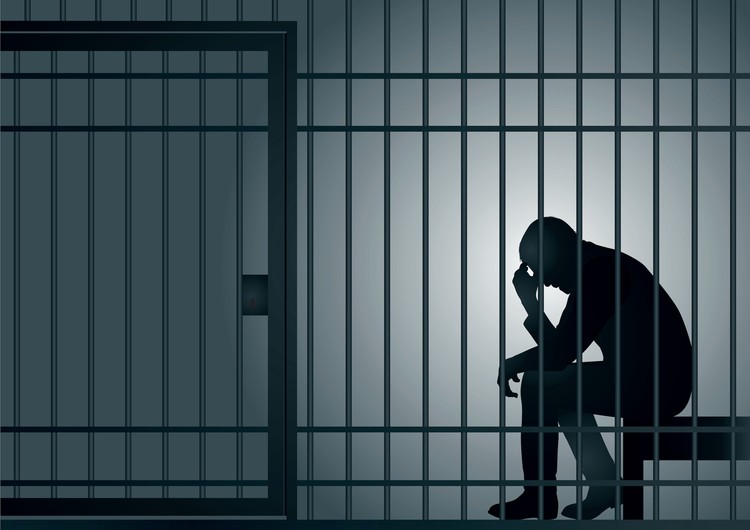Reports reveal horrors of solitary confinement in prisons
Judicial Inspectorate for Correctional Services says this is a violation of the Constitution
The conditions of inmates in solitary confinement could be considered a form of torture, says the Judicial Inspectorate for Correctional Services. Photo: Royalty-free stock vector ID: 1349712146 By Pictrider via Shutterstock
- Reports by the Judicial Inspectorate for Correctional Services (JICS) reveal harsh conditions in solitary confinement in SA prisons.
- Some inmates spend 23 hours a day without human contact and exercise alone in “cages”.
- The Inspectorate says this is a violation of the Constitution.
- The reports have been handed to the Minister of Justice and the chair of Parliament’s portfolio committee on Justice and Correctional Services.
Inmates in solitary confinement in some South African prisons spend 22 or 23 hours a day without any meaningful human contact, sometimes for months. They are “caged” even when they exercise for one hour, and are served food through a sliver in the cell door.
In recent reports handed to the Minister of Justice and Correctional Services and Parliament’s committee on Justice and Correctional Services, the Judicial Inspectorate for Correctional Services (JICS), has expressed its “deep concern” about the harsh impact of solitary confinement which, it says, could be considered a form of torture and must be done away with.
The prison watchdog, under the leadership of inspecting judge Edwin Cameron, retired from the Constitutional Court, has submitted that prison authorities are in violation of the Constitution, the Correctional Services Act and international law norms and standards.
JICS says the act only permits segregation under strictly specified conditions, which exclude solitary confinement.
“Solitary confinement is contrary to South Africa’s commitment to a human rights approach to crime and punishment. It was employed during apartheid. Our democracy rightly excised this inhumane practice from the act.
“Now, as the Constitution requires, we must ensure that conditions of incarceration are consistent with the human dignity and good health of inmates. Correctional centres cannot be Constitution, or law-free zones imposing a moratorium on inmates’ rights,” JICS says.
The reports follow three unannounced inspections last year at the Ebongweni Super Maximum Correctional Centre, the Kgosi-Mampuru II C-Max Correctional centre and Mangaung Public-Private Partnership Correctional Centre.
JICS, in a statement, said these inspections confirmed that inmates were being subjected to solitary confinement and prolonged solitary confinement at both Ebongweni and Kgosi-Mampuru centres.
“At both these centres, inmates sit alone in a single cell for 22-23 hours a day without stimulation or human contact. There is an hour of exercise – not with other inmates, but alone, in an isolated exercise cage.”
“Food is provided through a slim post-box sliver. The initial period of solitary confinement extends for at least six months,” JICS said.
“When inmates are transferred from Ebongweni to Kgosi-Mampuru II C-Max, as occurs, years of prolonged solitary confinement eventuate.”
JICS said the situation has been confirmed by the Department of Correctional Services.
In response to reports submitted late last year, the department said: “The findings in the JICSreport is noted and acknowledged, inmates are kept in their cells for twenty-three hours and given an hour’s exercise, which is in accordance with the Standard Operating Procedures of the facility.”
JICS said not all inmates in the C-max maximum security prisons were “the most dangerous and violent”.
“JICS established that the department transfers some inmates to these centres without following due process or meeting the criteria necessary for a lawful transfer.”
“Some inmates are part of mass overnight transfers, or they are transferred for petty transgressions or simply on the basis of the length of their sentence.”
The inspectorate said it was deeply concerned about the harsh impact of solitary confinement which resulted in severe long-term health issues, including depression and suicidal tendencies.
There was no evidence that solitary confinement deterred crime.
The inspectorate said it would now engage with the South African Human Rights Commission’s National Preventive Mechanism against torture, and with others, to offer reform recommendations.
JICS spokesperson Emerantia Cupido said the inspectorate was awaiting feedback from the portfolio committee.
Chrispin Phiri, spokesperson for Justice and Correctional Services Minister Roland Lamola,told GroundUp he was waiting for a copy of the report.
The chairman of the portfolio committee, Bulelani Magwanishe, did not respond to our message.
We are still trying to obtain copies of the reports.
Support independent journalism
Donate using Payfast

Don't miss out on the latest news
We respect your privacy, and promise we won't spam you.
Next: Why we need the James Webb Space Telescope AND the SKA
Previous: Eastern Cape community health workers protest about job cuts
© 2022 GroundUp. This article is licensed under a Creative Commons Attribution-NoDerivatives 4.0 International License.
You may republish this article, so long as you credit the authors and GroundUp, and do not change the text. Please include a link back to the original article.
We put an invisible pixel in the article so that we can count traffic to republishers. All analytics tools are solely on our servers. We do not give our logs to any third party. Logs are deleted after two weeks. We do not use any IP address identifying information except to count regional traffic. We are solely interested in counting hits, not tracking users. If you republish, please do not delete the invisible pixel.

